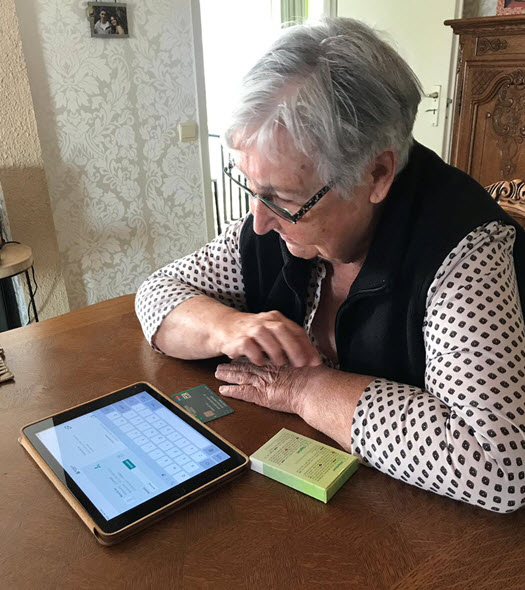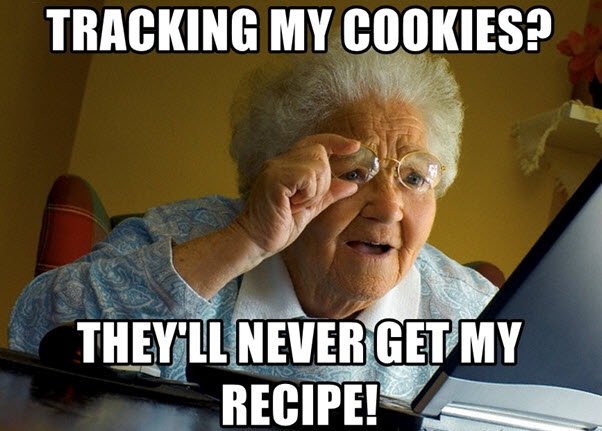2019-May-29
Did you know? You can share this story using the social media icons on the upper left. Use the hashtag #WeAreCisco. You can also rate or comment on the story below.
Helping Grandma Stay Safe on the Internet
BY DONALD DE WITTE · BDM COLLABORATION SERVICES CX · SPAIN
When my 74-year-old mother got an iPad, she wasted no time exploring the brave new world of cyberspace.
She wanted a Facebook account to stay up to date with her grandchildren. She hoped to use email to pay her electric bill online. She was curious whether she could actually buy an airline ticket without a trip to the travel agent.

At first, her eagerness to take the plunge online made me nervous. But I understood there are many excellent reasons for elders to want to be connected. According to the Pew Research Center, more than two-thirds of seniors now use the internet, and four in 10 own a smartphone.
As a Cisco employee, I get access to the latest and greatest of our industry-leading internet security solutions. As someone keenly aware of the risks the internet poses for the unwary, I feel an urge to share my knowledge with those who need it to stay safe on the internet. People like my mother!
With that in mind, I reached out to a social club for senior citizens where I live, in Valldoreix, Spain. I wanted to make them aware of the risks they face online, but without scaring them off.
I proposed a session on “How to Stay Safe on the Internet.” To my surprise, more than 40 white-haired attendees showed up with their smartphones or tablets ready. The course was a hit!
Below, I’ve summarized the main vulnerabilities seniors face online and what they can do to stay safe. Please feel free to share the list with your grandparents, parents, and others who may be interested. I’ve also listed some of the top benefits of being online for seniors.
The top 5 vulnerabilities seniors — and the rest of us — face online today:
- Don’t get phished. Don’t open or respond to email messages from people you don’t know, or emails that promise free stuff — just delete them. They could contain viruses that could harm your computer. If you do open an email, don’t click on mysterious attachments, including those with offers or promises of gifts. Ignore requests to call numbers with unknown prefixes to collect your gift.
- Surfing while senior. Steer clear of websites that ask you for money, a credit card number, or investments. Always insist on secure connections. Look for the “s” in https — it stands for secure. Don’t trust sites with URLs that only begin with http. Keep your operating system software up to date and use security patches when available. Only use legal software and download it from official sites.
- Sharing isn’t always caring. Don’t share personal data online due to the risk of identity theft and other dangers. And don’t share photos of you or your family or information about your family with people you don’t know and trust. When filling out profiles online, don’t publish your personal data or details of your physical address or places you routinely go. Use a nickname instead of your real name and never give out your passwords. (I showed the seniors how fast I could copy a profile and pretend I was someone else.)
- Be camera shy. Be careful with your webcam — only use it with people you trust. When not in use, try to keep it disconnected or cover it with tape, or else point it toward the wall or floor.
- Online love is blind. Just because online romance can bloom for seniors doesn’t mean they have to be fools for love. When chatting online, be careful with the photos and information you share — they could be used to manipulate you. The person you’re chatting with might not be what their profile picture suggests. That Facebook user who invites you to be a friend might not be a friend at all. Similarly, think before you post. The internet is forever. Any image or information you publish there can be tough to erase. And someone else could copy and use it for their own purposes.
The top 5 reasons to get Grandma on the internet:
- Keep up with the grandkids. Many seniors love to use Facebook, WhatsApp, and email as a means of staying in touch with family and reconnecting with old friends. They can share photos as well as their opinions on the issues of the day. Skype and FaceTime are popular for video chatting. According to a study cited by the Brookings Institution, three out of four people aged 65 and older go online to communicate with family and friends.
- No car, no problem. The web is great for food shopping, banking, and paying bills online, especially for seniors that have trouble getting around. According to the study cited above, 58 percent of seniors go online to shop for products or services, and 46 percent to shop for bargains.
- Read all about it! With more and more news and information going digital, the internet offers an endless variety of publications and amount of information that seniors can consume from the comfort of their couch or via smartphone.
- Anyone for poker? Online games like solitaire, poker, monopoly, and mahjong can give seniors hours of entertainment — and a way to escape boredom and loneliness. Many seniors also watch TV shows, movies, and videos online.
- There’s a health app for that. Not surprisingly, many seniors — one in three, according to the study cited above — use the internet to get health and medical information. And there’s a plethora of apps, such as Map My Walk and My Fitness Pal, designed to help seniors get fit, stay healthy and lose weight.
Important Learnings

With a little training, the seniors I met showed themselves to be quick learners — some were even quite savvy. It was great fun and satisfying for me to share useful knowledge with them.
I also learned from their feedback. They all agreed that they use the internet more than they used to, thanks to the ease of use of smartphones and tablets. The abundance of apps for seniors is also a factor in their increased usage.
The session was such a hit that I plan on using some of my Time2Give days to offer more sessions in the future. My mother can’t wait to learn about topics such as the Internet of Things (IoT), artificial intelligence (AI), Blockchain, and more.
The bottom line: You’re never too old to learn.
Connect everything. Innovate everywhere. Benefit everyone.
Share your thoughts!
Log in to rate and commentShare your thoughts on the story here!